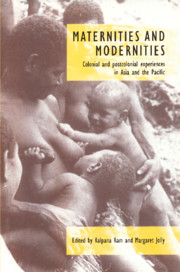Book contents
- Frontmatter
- Contents
- List of illustrations
- Notes on contributor
- Acknowledgements
- Map 1 Location of countries and regions in Asia and the Pacific discussed in this volume
- Introduction Colonial and postcolonial plots in histories of maternities and modernities
- 1 Shaping reproduction: maternity in early twentieth-century Malaya
- 2 Modernizing the Malay mother
- 3 ‘Good wives and mothers’ or ‘dedicated workers’? Contradictions of domesticity in the ‘mission of sisterhood’, Travancore, south India
- 4 Maternity and the story of enlightenment in the colonies: Tamil coastal women, south India
- 5 The dai and the doctor: discourses on women's reproductive health in rural Bangladesh
- 6 Other mothers: maternal ‘insouciance’ and the depopulation debate in Fiji and Vanuatu, 1890–1930
- 7 Just add water: remaking women through childbirth, Anganen, Southern Highlands, Papua New Guinea
- 8 From sisters to wives: changing contexts of maternity on Simbo, Western Solomon Islands
- Epilogue Maternal experience and feminist body politics: Asian and Pacific perspectives
- Index
Introduction Colonial and postcolonial plots in histories of maternities and modernities
Published online by Cambridge University Press: 06 July 2010
- Frontmatter
- Contents
- List of illustrations
- Notes on contributor
- Acknowledgements
- Map 1 Location of countries and regions in Asia and the Pacific discussed in this volume
- Introduction Colonial and postcolonial plots in histories of maternities and modernities
- 1 Shaping reproduction: maternity in early twentieth-century Malaya
- 2 Modernizing the Malay mother
- 3 ‘Good wives and mothers’ or ‘dedicated workers’? Contradictions of domesticity in the ‘mission of sisterhood’, Travancore, south India
- 4 Maternity and the story of enlightenment in the colonies: Tamil coastal women, south India
- 5 The dai and the doctor: discourses on women's reproductive health in rural Bangladesh
- 6 Other mothers: maternal ‘insouciance’ and the depopulation debate in Fiji and Vanuatu, 1890–1930
- 7 Just add water: remaking women through childbirth, Anganen, Southern Highlands, Papua New Guinea
- 8 From sisters to wives: changing contexts of maternity on Simbo, Western Solomon Islands
- Epilogue Maternal experience and feminist body politics: Asian and Pacific perspectives
- Index
Summary
The link between maternities and modernities is more than an alliterative conjunction. These essays attest to how projects of modernity have also entailed remoulding maternity. But, whereas some recent studies have seen this relationship as singular and have typically privileged Euro- American experiences, we pluralize understandings both of maternity and of modernity and problematize the way we plot their relation. Moreover, the focus on Asia and the Pacific not only provides a different site for experiences of, and discourses about, maternity but suggests how these sites were and are connected in the processes of colonialism and postcolonial development. We highlight how class-based interventions in mothering in many countries of Europe and North America were paralleled by projects in European colonies where race, ethnicity and class compounded pre-existing local differences between women. In many Asian and Pacific countries indigenous patterns of mothering have been challenged and to some degree transformed, first in the colonial period and second in the postcolonial epoch, in the name of civilization, modernity and scientific medicine. But women in these places have not simply succumbed to the message of ‘enlightenment’ through maternal improvement, but have variously rejected or embraced such advice or accommodated it selectively. Such exercise of agency should not be construed as a matter of voluntaristic choices however, as if choosing between modes of mothering is akin to wheeling a supermarket trolley (Ram 1994:20). Indeed, this volume shows that such choices are saturated not just by the power of gender difference, but class and ethnicity. The embodied maternal subject is pervaded by a profound tension, perhaps even a split, as the mother is sundered in contests between ‘tradition’ and ‘modernity’.
- Type
- Chapter
- Information
- Maternities and ModernitiesColonial and Postcolonial Experiences in Asia and the Pacific, pp. 1 - 25Publisher: Cambridge University PressPrint publication year: 1998
- 19
- Cited by



